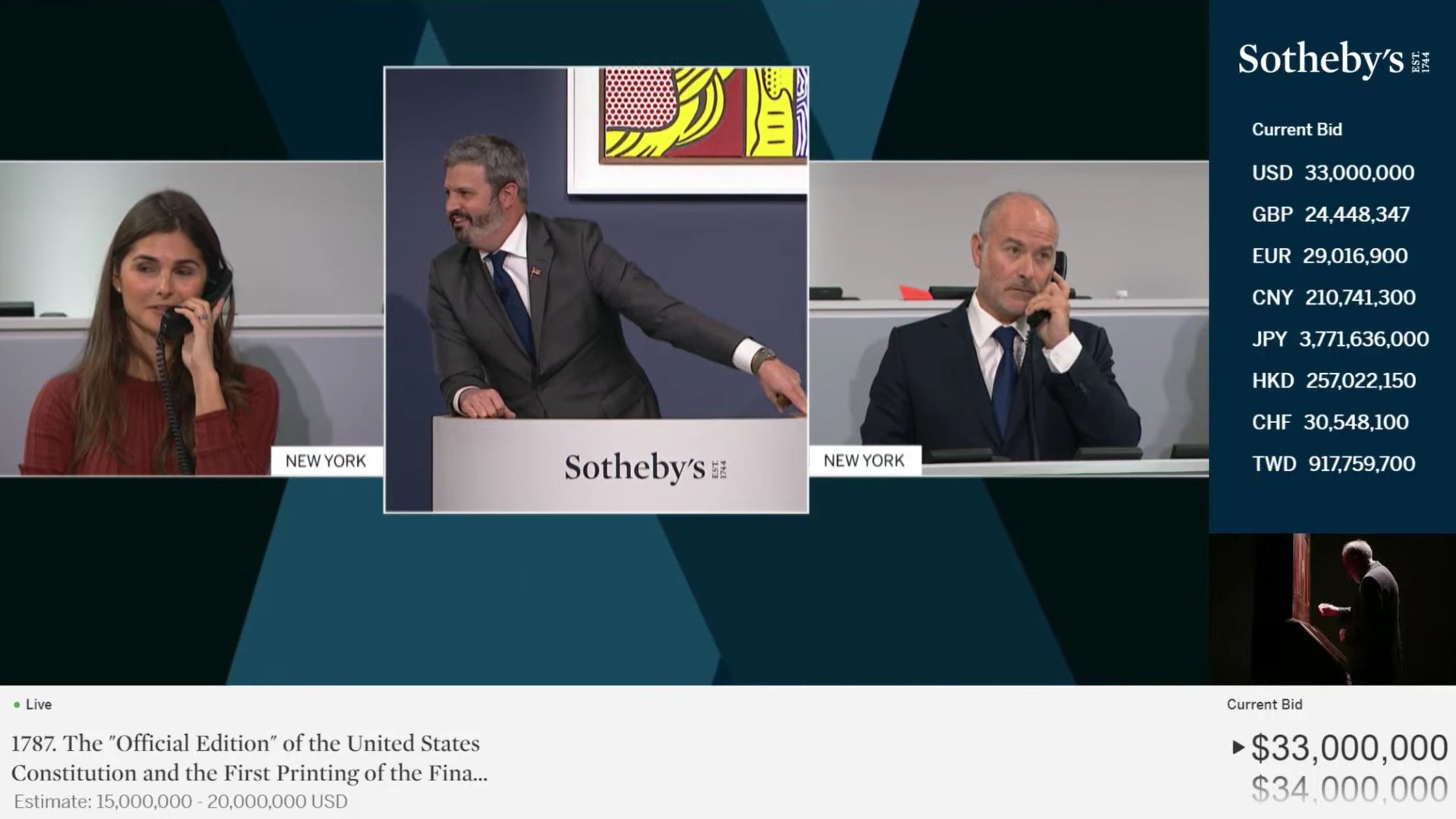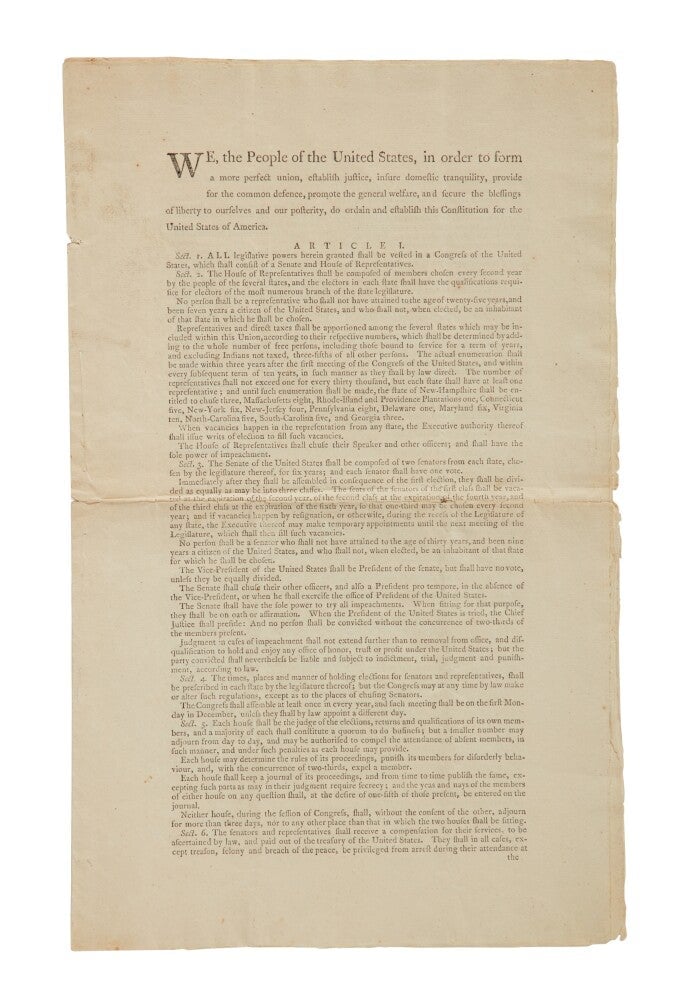Cryptocurrency investors raised $40 million to buy the US Constitution at Sotheby’s. It wasn’t enough
On Nov. 18, a group of cryptocurrency investors banded together to buy one of 13 rare copies of the US Constitution on sale at the auction house Sotheby’s. A group of 17,000 donors, set up as a decentralized autonomous organization, or DAO, organized itself entirely online to bid at the auction.


On Nov. 18, a group of cryptocurrency investors banded together to buy one of 13 rare copies of the US Constitution on sale at the auction house Sotheby’s. A group of 17,000 donors, set up as a decentralized autonomous organization, or DAO, organized itself entirely online to bid at the auction.
ConstitutionDAO was established by a core team of 35 people to “put the Constitution in the hands of the people,” as the group states on its website. It planned to publicly display the Constitution, one of 500 copies in a first printing, for free at an institution willing to cover the costs of housing the document dating back to 1787.

It was the first time a DAO bid at Sotheby’s, an auction house where billionaires, sovereign wealth funds, and museums often go to purchase blue-chip art. Each donor contributed varying sums and the group raised more than $40 million, to acquire the artifact, showcasing the financial potential of collective organizing online.
But ConstitutionDAO was outbid. An anonymous private collector spent $43.2 million on the document, more than doubling Sotheby’s original estimate. ConstitutionDAO’s organizers said they will return the money, minus some crypto transaction fees, to its more than 17,000 donors. The group’s effort serve as a coming-out party for DAOs, structures many in the crypto community believe will be a governance structure for the future of the internet.
What is a DAO?
DAOs, or decentralized autonomous organizations, represent a new approach to organizing large groups online. As their name suggests, members of DAO often do not know each other and are organized into collectives, without centralized leadership or hierarchy. Groups typically have public bylaws and interactions are governed by blockchain technology, including financial transactions and member voting. (Quartz has an in-depth explainer on this topic.)
DAOs vary, but most are organized according to principles referred to as web3, a crypto-optimist vision of a decentralized web. It’s a model built on the promise of blockchains, which offer cryptographic encryption and validate transactions across many different computers rather than relying on tech giants such as Google, Facebook, or Amazon. Web3 advocates think decentralization will improve online security, control of personal data, and finance.
It’s the next evolution of online trends that have bubbled up during the pandemic. In the last two years, the prices of cryptocurrencies like bitcoin and ether have soared and digital artists, minting their work on blockchains as nonfungible tokens (NFTs), have ingratiated themselves with auction houses. Additionally, retail investors learned to band together around so-called meme stocks like GameStop and AMC Entertainment, proving their power against Wall Street short-sellers.
Many DAOs are financial in nature—ways to get people together en masse to buy things. Recently, DAOs have bought expensive NFTs, the rare Wu-Tang Clan album once owned by Martin Shkreli, and one is even trying to buy a National Basketball Association team. Some DAOs promise fractional ownership of the bought items.
That was not the case with the Constitution-buying effort. Some organizers of the effort advocated for fractional ownership, according to The New York Times, but were nervous about violating securities law. (The initial coin offering, or ICO, craze of 2017 was stymied when the US Securities and Exchange Commission cracked down on these crypto venture fundraising efforts as illegal securities.) Instead, the ConstitutionDAO website states donors receive a “governance token, not fractionalized ownership” that would entitle donors to voting rights over the Constitution—particularly, over where it’s stored and how it’s used.
The Sotheby’s evening auction
ConstitutionDAO’s bidding did not go as hoped at Sotheby’s. Members watched a livestream on YouTube, where commentary from DAO members flooded the video’s sidebar. After competitive bidding, the field quickly narrowed down to two parties represented by Brooke Lampley, Sotheby’s chairman and worldwide head of sales, and David Schrader, the worldwide head of private sales. (Auction house representatives were on live phone lines communicating with the potential buyers.)
But the DAO members, many having waited as artworks of Matthew Wong, Mark Bradford, and street artist Banksy were auctioned off, seemed unclear about who was representing them during the bidding for the copy of the Constitution.
“Are we with brook or david? Who’s dao?,” one user wrote on YouTube. “ARE WE BROOKE OR DAVID????????” another pleaded. Finally, Lampley, paddle 411 in hand, won the bid. But it took close to 15 minutes until the ConstitutionDAO Twitter handle posted about its own defeat, and for misplaced celebrations and widespread confusion to end. Lampley represented a different buyer.
“While this wasn’t the outcome we hoped for, we still made history tonight,” the statement read, hailing the effort as a victory for crowdfunding, online organizing, and DAOs. But the ultimate goal was clear. “We have educated an entire cohort of people around the world—from museum curators and art directors asking us what [ether] is when they read about us in the news—about the possibilities of web3.”
If successful, ConstitutionDAO would have been a fascinating example of a new form of online governance as web3 advocates push for a decentralized internet. But as millions of dollars are returned to the DAO’s members, there might be a slight sigh of relief from those on the “core team”—the effective leaders of an organization without an official hierarchy. Now they, and 17,000 other strangers don’t have to worry about how to govern the collective—and what to do with a copy of the US Constitution.